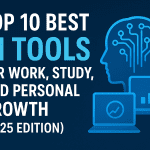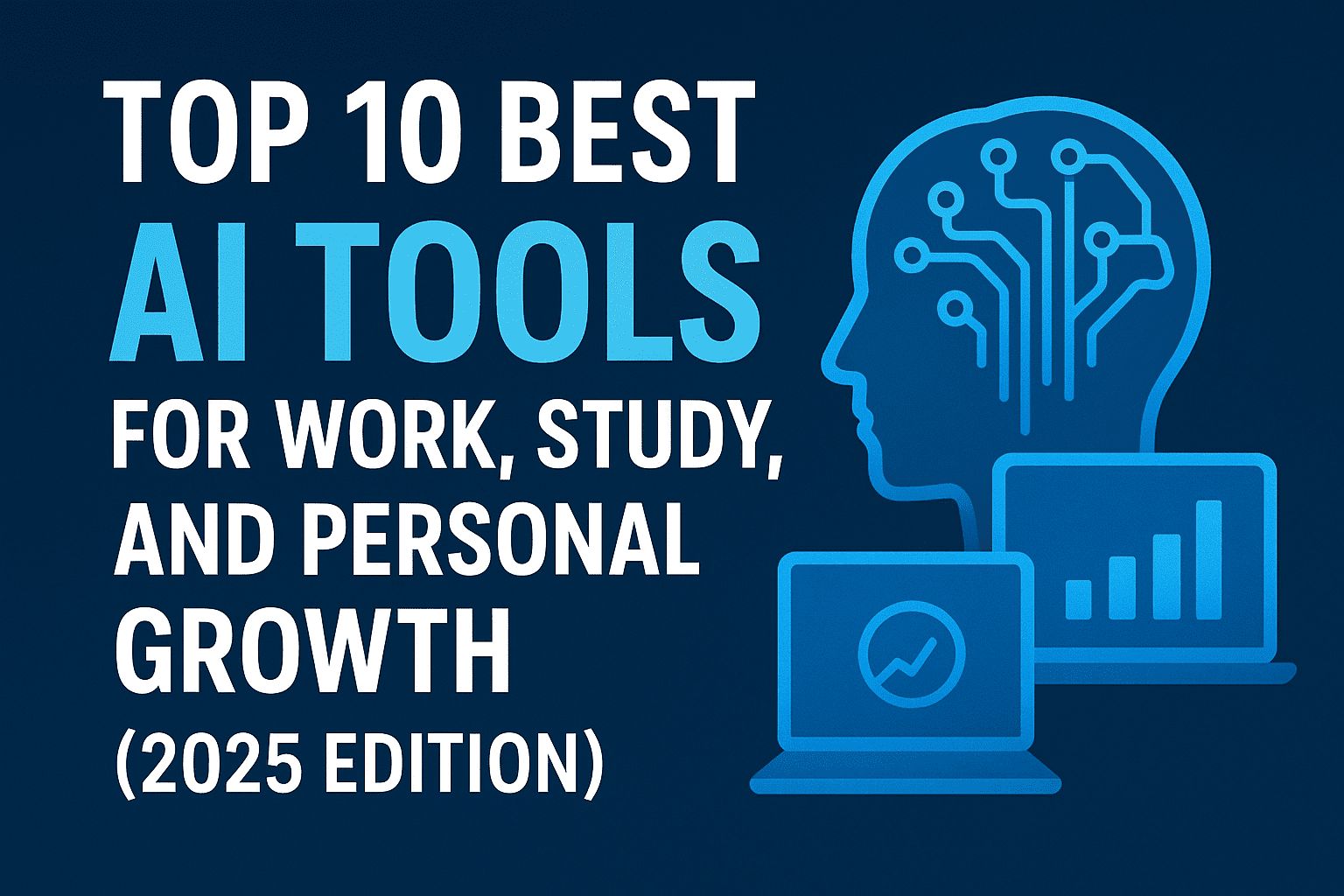Artificial Intelligence (AI) is no longer science fiction—it’s part of our everyday lives. From writing emails and summarizing research to improving mental health and learning languages, AI tools are helping people work smarter, study faster, and grow personally.
But with thousands of apps and tools out there, it’s easy to feel overwhelmed. That’s why we’ve curated this list of the top 10 AI tools in 2025 that can genuinely make a difference in your daily routine.
1. ChatGPT (OpenAI)
Best for: Writing, brainstorming, learning, and problem-solving.
ChatGPT has become the go-to AI assistant for millions. It can generate ideas, explain complex concepts, help with coding, and even draft professional emails. Think of it as your 24/7 digital co-pilot.
✅ Use Cases:
- Write blog posts, essays, or reports.
- Get summaries of lengthy documents.
- Practice interview questions or presentations.
- Debug code or generate scripts.
⚡ Pros: Free/affordable, versatile, and easy to use.
⚠️ Cons: Sometimes gives outdated or overly generic answers.
💡 Pro Tip: Use it with plugins or connected apps to boost research, planning, or writing speed.
2. Notion AI
Best for: Productivity, organization, and note-taking.
Notion was already powerful, but Notion AI takes it further by automating summaries, generating task lists, and creating study outlines.
✅ Use Cases:
- Organize projects with smart summaries.
- Convert lecture notes into quick study guides.
- Build a digital planner or “second brain.”
⚡ Pros: Integrates with Notion’s flexible workspace.
⚠️ Cons: Requires a subscription for AI features.
💡 Pro Tip: Create a “weekly learning hub” where Notion AI summarizes your notes, tasks, and reflections.
3. GrammarlyGO
Best for: Professional and academic writing.
Beyond correcting grammar, GrammarlyGO suggests tone adjustments, rewrites, and even generates drafts. It’s perfect for emails, essays, and client communication.
✅ Use Cases:
- Draft cover letters in a professional tone.
- Rewrite essays for clarity.
- Create polished blog posts quickly.
⚡ Pros: User-friendly, integrates into browsers and apps.
⚠️ Cons: Best features require a premium plan.
💡 Pro Tip: Use GrammarlyGO to fine-tune drafts written in ChatGPT for maximum polish.
4. Perplexity AI
Best for: Research and fact-checking.
Think of Perplexity as a smarter search engine—it doesn’t just list results, it provides clear, sourced answers. Perfect for students and professionals.
✅ Use Cases:
- Research essays or projects with reliable citations.
- Get fact-checked answers to complex questions.
- Summarize academic papers or reports.
⚡ Pros: Transparent citations, fast answers.
⚠️ Cons: Still new—sometimes limited sources.
💡 Pro Tip: Use Perplexity + Elicit (see below) for unbeatable academic research.
5. Jasper AI
Best for: Marketing, SEO, and content creation.
Jasper is designed for businesses that need scalable content—blogs, ads, email campaigns, and social posts.
✅ Use Cases:
- Write ad copy for Facebook/Google.
- Generate blog posts optimized for SEO.
- Create scripts for YouTube or TikTok.
⚡ Pros: Great templates, SEO-friendly.
⚠️ Cons: Subscription-based, not ideal for casual users.
💡 Pro Tip: Pair Jasper with SurferSEO to rank higher on Google.
6. Otter.ai
Best for: Meetings, lectures, and interviews.
Otter.ai is a lifesaver for anyone in meetings or classes. It records, transcribes, and summarizes conversations in real time.
✅ Use Cases:
- Take lecture notes automatically.
- Summarize Zoom or Google Meet calls.
- Generate action items from team meetings.
⚡ Pros: Saves hours of manual note-taking.
⚠️ Cons: Works best in English; accuracy drops in noisy environments.
💡 Pro Tip: Share transcripts with teammates or classmates for collaborative review.
7. QuillBot
Best for: Rewriting and paraphrasing.
QuillBot is a favorite among students and writers who need to rephrase content without losing meaning.
✅ Use Cases:
- Paraphrase research notes.
- Simplify complex academic writing.
- Repurpose blog content for different platforms.
⚡ Pros: Free plan available, easy to use.
⚠️ Cons: Overuse can make writing sound robotic.
💡 Pro Tip: Use in moderation—always add your own voice.
8. Elicit
Best for: Academic and scientific research.
Elicit is an AI research assistant that finds and summarizes academic papers based on your topic. Perfect for college students or researchers.
✅ Use Cases:
- Quickly review studies for essays.
- Generate summaries of scientific literature.
- Find relevant papers without hours of searching.
⚡ Pros: Saves massive time, especially for theses.
⚠️ Cons: Limited outside academic research.
💡 Pro Tip: Use alongside Perplexity for a balanced research workflow.
9. Replika
Best for: Mental health and personal growth.
Replika is an AI companion that helps with mindfulness, journaling, and emotional support. While not a replacement for therapy, it’s great for reflection.
✅ Use Cases:
- Practice conversations in a safe space.
- Journal your thoughts and track emotions.
- Build daily mindfulness habits.
⚡ Pros: Accessible, judgment-free companion.
⚠️ Cons: Limited depth compared to human support.
💡 Pro Tip: Use it as a self-care supplement, not a replacement for professional help.
10. Duolingo Max (AI-Powered)
Best for: Language learning.
Duolingo now uses AI for real-world conversations and grammar corrections, making language learning more interactive.
✅ Use Cases:
- Practice dialogue with AI roleplay.
- Receive instant corrections with explanations.
- Build daily language-learning streaks.
⚡ Pros: Fun, gamified, and effective.
⚠️ Cons: Limited to supported languages.
💡 Pro Tip: Combine Duolingo Max with YouTube and podcasts for fluency.
🌟 Bonus AI Tools Worth Exploring
- Claude AI – An alternative to ChatGPT with longer context and safer outputs.
- Canva AI – Create designs, presentations, and social media posts effortlessly.
- Socratic (by Google) – AI study assistant for students solving homework problems.
- Copy.ai – Specialized in quick marketing copy and captions.
- Krisp AI – Removes background noise in meetings.
✨
AI is not about replacing human creativity—it’s about enhancing it. From writing smarter to studying faster and improving personal growth, these AI tools can transform how you live and work.
👉 The best strategy? Start with one or two tools, integrate them into your daily routine, and scale up from there. Remember: The future belongs to those who know how to use AI, not fear it.









